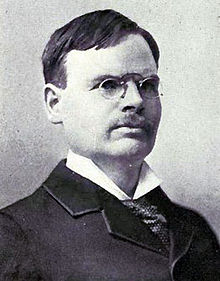
Back ويليام ويلفريد كامبل Arabic ويليام ويلفريد كامبل ARZ ویلیام ویلفرد کمپبل AZB William Wilfred Campbell German William Wilfred Campbell Italian William Wilfred Campbell Polish William Wilfred Campbell SIMPLE ولیم ولفریڈ کیمبل Urdu
William Wilfred Campbell | |
|---|---|
 | |
| Born | 1 June 1860 Newmarket, Canada West |
| Died | 1 January 1918 (aged 57) Ottawa, Ontario |
| Resting place | Beechwood Cemetery, Ottawa |
| Occupation | Civil Servant |
| Language | English |
| Genre | Poetry |
| Literary movement | Confederation Poets |
| Notable works | Lake Lyrics and Other Poems |
| Notable awards | FRSC |
| Spouse | Mary Louisa DeBelle (née Dibble) |
| Children | Margery, Faith, Basil, Dorothy |
| Signature | |
William Wilfred Campbell (1 June c. 1860 – 1 January 1918) was a Canadian poet. He is often categorized as one of the country's Confederation Poets, a group that included Charles G.D. Roberts, Bliss Carman, Archibald Lampman, and Duncan Campbell Scott; he was a colleague of Lampman and Scott. By the end of the 19th century, he was considered the "unofficial poet laureate of Canada."[1] Although not as well known as the other Confederation poets today, Campbell was a "versatile, interesting writer" who was influenced by Robert Burns, the English Romantics, Edgar Allan Poe, Ralph Waldo Emerson, Henry Wadsworth Longfellow, Thomas Carlyle, and Alfred Tennyson. Inspired by these writers, Campbell expressed his own religious idealism in traditional forms and genres.[2][3]
- ^ Adams, John Coldwell. "Confederation Voices: Seven Canadian Poets". Retrieved 12 November 2011.
- ^ Ware, Tracy. "Campbell, William Wilfred". Archived from the original on 11 May 2006. Retrieved 12 November 2011.
- ^ Malloch, Faith L. "An Intimate Picture of Wilfred Campbell". Retrieved 12 November 2011.